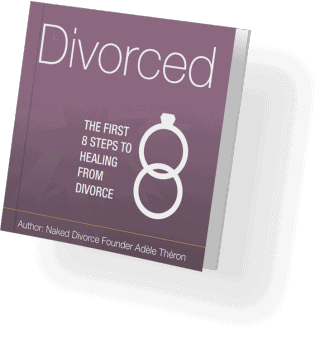
Free e-book: The First 8 Steps to healing from divorce
How To Cope With Rejection Without Getting Crushed during your divorce

It’s over
No matter how secure and confident you thought you were, hearing the person you love(d) say that they no longer want to be with you is a shattering experience. Even if you feel the same way, rejection is still hard to bear.
Another person has just told you that they’d prefer not to be with you. How can that not hurt?
Friends might tell you that you’re better off. They were never right for you. You’ll be happier. Perhaps all these things are true. But it doesn’t matter, does it? All you can think is: I wasn’t good enough.
Such is the power of rejection. In fact, whether you’re rejected by a partner, a prospective employer, or someone you reach out to in friendship, research suggests that the pain stings as sharply as a physical hurt. And the worst part is that you turn this pain back in on yourself.
Rejection becomes shamewww.independent.co.uk/news/science/brain-treats-rejection-like-physical-pain-say-scientists-8884507.html
Shame makes us behave in horrible ways. It can make us violent, vicious or self-destructive. Prison psychiatrist James Gilligan once said:
“I have yet to see a serious act of violence that was not provoked by the experience of feeling shamed and humiliated, disrespected and ridiculed… all violence is an attempt to replace shame with self-esteem.”
I’m not saying that feeling shamed by your rejection is going to turn you into a criminal, but it can certainly make you volatile and prone to lash out. And by moving the battleground inside yourself, shame makes it impossible to heal.
So how do you stop this happening? First, take a good, hard look at what rejection really is.
It’s not always about you
Jia Jiang, who literally wrote the book on how to handle rejection, spent years researching the subject firsthand. He learned that rejection is only partly about you.
It’s mostly about the other person: their headspace, their circumstances and, often, their hang-ups. They’re not an authority on your value as a partner or human being. They’ve made a decision based on their situation, what they feel they need – and whether they believe you’ll offer that.
They could well be wrong. And even if they’re right, if what you offer isn’t what they’re after, that doesn’t mean it’s bad – it means you’re offering it to the wrong person.
Of course, that’s not to say your actions aren’t a factor; things you’ve done may have spurred on your breakup.
The important thing is recognising the gap between what you do and who you are; the gap between guilt and shame.
Guilt is feeling that you shouldn’t have done something. You shouldn’t have lost your temper. You shouldn’t have lied. You shouldn’t have cheated. We can cope with guilt because it’s attached to quantifiable things: we can choose not to do them again, meaning we can cut them off from ourselves.
Shame is different. Shame is not a horror of what you did, it’s a horror of who you are. You didn’t just raise your voice; you’re hysterical. You didn’t just tell a lie, you’re a liar. You didn’t just cheat, you’re a cheater.
Once you’ve decided that you’re the type of person who does these things, it’s very, very hard to stop doing them. You might loathe yourself, but you can’t help it, you think. It’s who you are.
If you let rejection shame you, you risk doing one of two things: You risk lashing out in anger to claw back your self-esteem, or believing that you deserve shame.
Neither of these will help you handle and heal from your trauma. Neither will help you repeating they cycle again when a new relationship comes around.
Instead:
- Take a good, hard look at the reasons for your breakup, distinguishing between the things you both did and the ways your personalities, attitudes or beliefs grated.
- Be gentle but honest with yourself about the things you did that might have been damaging. Forgive yourself for these missteps while recognising that they were the result of choice, not fate, and resolving to learn from your mistakes.
- Don’t shut yourself off: all you’re doing is rejecting yourself before anyone else has a chance. Remind yourself what is great about who you are and what you offer as a person – as well as what you really value and desire in a partner. When you’re ready, be willing to take the risk.
Are you struggling to cope with the emotional trauma of your divorce? Book your free clarity call with us today.
If you enjoyed this post, I’d be very grateful if you’d help it spread by emailing it to a friend, or sharing it on Twitter or Facebook.
With you in service

 Book a Clarity Call for any divorce or break up support you need,
Book a Clarity Call for any divorce or break up support you need,

